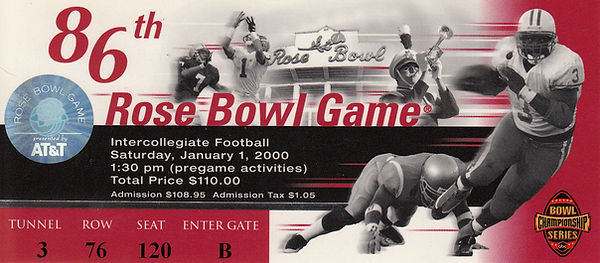
Heisman Trophy
Ticket Museum
This site is dedicated to the history of college football and its most coveted award...
The Heisman Memorial Trophy
which is presented annually to college football's most outstanding player.
The purpose of this site is to chronicle the college football season of every Heisman Memorial Trophy winner as illustrated through the beauty and artistry of game ticket stubs.
My goal is to collect a ticket stub, press pass, sideline pass, or any other form of entry to every regular season football game played during each Heisman Trophy winners Heisman Trophy winning season.
While I do prefer game ticket stubs over all other forms of entry, I will include others when I cannot find a ticket stub. I do add Bowl games and Playoff games, but they are not mandatory to the collection.
I am continually searching for the missing ticket stubs for this collection.
Please let me know if you have any of my needs available for sale or trade.
These missing tickets can be seen on each page identified with a "wanted" icon.
They can also be found in list form by clicking on the on the "TICKETS NEEDED" tab.
To date, I have acquired 860 of the 955 tickets (90%) necessary
to complete the collection between the years of 1935-2025.
Tickets beginning with the COVID-19 year of 2020 are very difficult to obtain as most schools and venues stopped printing tickets, instead going to digital formats.
I do not include any ticket from the COVID-19 year (2020) and going forward in the total
required for completion, unless I have obtained one and it as part of the collection.
That being said, on most occasion's they do exist in box office form.
I still try to obtain them when I am able to do so.
Please use the tabs below to view this collection by decade.
(for best viewing, I recommend using the desktop version, but a mobile version is also available)
I hope you enjoy this site as much as enjoy bringing it to you!
1990 Ty Detmer - Brigham Young
Detmer was born in San Marcos, Texas, and attended Southwest High in San Antonio, where he earned letters in golf, football, basketball, baseball, and track. As a 1986 senior, Detmer won high school All-American honors in football and was the Texas Player of the Year. He also won all-state honors in baseball and all-district accolades in basketball.
He signed with BYU and, after redshirting the 1987 season, showed early flashes of greatness in 1988 by coming off the bench to lead the Cougars to a 20-17 win over Colorado in the Freedom Bowl.
Detmer took over the starting job the following season and set the NCAA record for passing by a sophomore with 4,560 yards (with 32 touchdowns). His rating of 175.6 nearly broke the NCAA record for pass efficiency in a season. On December 1, 1990, Ty Detmer was awarded the Heisman Trophy.

The 6-foot, 175-pounder finished the 1990 regular season with 5,188 yards passing and 41 touchdowns to go with 5,022 yards of total offense. Detmer won BYU’s first Heisman by producing the most passing yards and total offense in the history of the award. He is the last Heisman winner to come from a school that does not play in a major FBS conference. By the end of his collegiate career, Detmer had broken 59 NCAA records and tied three others. After finishing his record-setting career at BYU and earning a bachelor’s degree in recreation administration, Detmer was drafted in the 9th round of the 1992 NFL draft by the Green Bay Packers. He had a pretty decent journeyman career, playing for the Packers, Philadelphia Eagles, Cleveland Browns and the Atlanta Falcons.
Ty Detmer was elected into the College Football Hall of Fame in 2012.
Ty Hubert Detmer (October 30, 1967)

9/1/1990 at U.T.E.P.
(W 30-10)
(attendance 29,033)


9/8/1990 vs. Miami
(W 28-21)
(attendance 66,235)
9/15/1990 vs. Washington State
(W 50-36)
(attendance 65,848)

9/29/1990 at Oregon
(L 16-32)
(attendance 45,022)

10/27/1990 vs. New Mexico
(W 55-31)
(attendance 66,086)

11/10/1990 at Wyoming
(W 45-14)
(attendance 34,231)

9/22/1990 vs. San Diego State
(W 62-34)
(attendance 66,044)

10/13/1990 vs. Colorado State
(W 52-9)
(attendance 65,922)
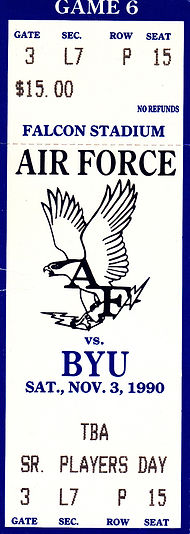
11/3/1990 at Air Force (full ticket)
(W 54-7)
(attendance 26,513)

11/17/1990 at Utah
(W 45-22)
(attendance 33,515)

11/24/1990 vs. Utah State
(W 45-10)
(attendance 65,876)

12/1/1990 at Hawaii
(L 28-59)
(attendance 45,729)

12/6/1990 Heisman Trophy Presentation
(guest ticket)
1991 Desmond Howard - Michigan
Howard was born in Cleveland, Ohio and earned All-American and All-Ohio honors as a tailback during his 1987 senior season at St. Joseph High School, scoring 18 touchdowns while snagging 10 interceptions on defense. He earned three varsity letters each in track and football, as well as one in basketball.
He chose to attend Michigan as a running back, but struggled early in his career. Three days into his first camp in Ann Arbor, it was decided to try him at wide receiver. The transition was not a smooth one and Howard redshirted his freshman year in 1988 and had just nine catches in 1989. He broke out as a sophomore, however, with 63 catches for 1,025 yards and 11 touchdowns. He also showed his versatility, running for 58 yards and averaging 29.6 yards on kickoffs, with a touchdown return. Howard was sublime as a 1991 junior as he helped Michigan to a 10-1 regular season record, a Big Ten title and a No. 4 ranking. His acrobatic catches and explosive returns

Desmond Keith Howard (May 15, 1970)
made him one of the most electrifying players ever to play the college game. He became the first receiver in Big Ten history to lead the conference in scoring (138 points) as he set or tied five NCAA records and 12 single-season Michigan records. He caught 61 passes for 960 yards and 19 scores, rushed 12 times for 165 yards and two TDs, averaged 15.3 yards (with a TD) on punt returns and 31 yards on kick returns (with a TD). On December 14, 1991, Desmond Howard was awarded the Heisman Trophy. The All-American won the Heisman by the second largest margin of victory in the trophy’s history. The Washington Redskins drafted him in the first round of the 1992 NFL draft, fourth overall. While he never caught on as a receiver, he turned himself into one of the greatest kick returners in NFL history and won a Super Bowl MVP with the Packers.
Desmond Howard was elected into the College Football Hall of Fame in 2010.

9/7/1991 at Boston College
(W 35-13)
(attendance 32,071)

9/14/1991 vs. Notre Dame
(W 24-14)
(attendance 106,138)

9/28/1991 vs. Florida State
(L 31-51)
(attendance 106,145)

10/5/1991 at Iowa
(W 43-24)
(attendance 70,220)
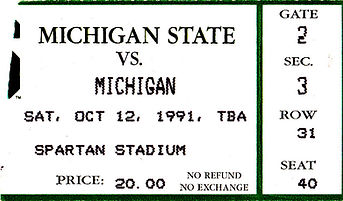
10/12/1991 at Michigan State
(W 45-28)
(attendance 80,157)

10/19/1991 vs. Indiana
(W 24-16)
(attendance 106,097)

10/26/1991 at Minnesota
(W 52-6)
(attendance 32,577)


11/2/1991 vs. Purdue
(W 42-0)
(attendance 105,401)

11/16/1991 at Illinois
(W 20-0)
(attendance 66,757)
11/9/1991 vs. Northwestern
(W 59-14)
(attendance 102,087)

11/23/1991 vs. Ohio State
(W 31-3)
(attendance 106,156)

12/17/1991 Heisman Trophy Presentation
(guest ticket)

12/14/1991 Heisman Trophy Announcement Credential
1992 Gino Torretta - Miami
Torretta was born in Pinole, Calif., and starred for the Pinole High football team as a senior in 1987. He joined the Miami football program the following season and, after redshirting, he was a timely contributor to the 1989 national title team, throwing for 1,325 yards and eight touchdowns in relief of the injured Craig Erickson. His big highlight was a school-record 485 passing yards against San Diego State. He was less productive as a sophomore, throwing for 210 yards as a reserve, but he won the starting job in 1991 and proceeded to lead Miami to its fourth national title in nine season. Torretta had 3,095 yards and 20 touchdowns as the ‘Canes went 12-0. He entered the 1992 season as one of the favorites for the Heisman and he did not disappoint. Torretta threw for 3,070 yards and 19 touchdowns to once again lead Miami to an undefeated regular season.

On December 12, 1992, Gono Torretta was awarded the Heisman Trophy. When he was awarded the Heisman over Marshall Faulk, the ‘Canes were sitting on 29-straight wins — 23 of them with Torretta as the starter. Torretta also won the Johnny Unitas Golden Arm Award, the Maxwell Trophy and the Davey O’Brien national quarterback awards. He finished his Miami career with eleven school passing records, including career attempts (991), completions (555), yards (7,690), total offense (7,772), longest pass (99 yards to Horace Copeland vs. Arkansas, an NCAA record) and most passing yards in a game (485 vs. San Diego State).
In 2008, Torretta was inducted into the University of Miami’s Ring of Honor.
Gino Torretta was inducted into the College Football Hall of Fame in 2009.
Gino Louis Torretta (August 10, 1970)

9/5/1992 at Iowa
(W 24-7)
(attendance 70,397)

9/19/1992 vs. Florida A&M
(W 38-0)
(attendance 74,292)

9/26/1992 vs. Arizona
(W 8-7)
(attendance 47,049)

10/3/1992 vs. Florida State
(W 19-16)
(attendance 77,338)


10/17/1992 vs. Texas Christian
(W 45-10)
(attendance 42,915)
10/10/1992 at Penn State
(W 17-14)
(attendance 96,704)

10/24/1992 at Virginia Tech
(W 43-23)
(attendance 51,423)


11/14/1992 vs. Temple
(W 48-0)
(attendance 41,212)
10/31/1992 vs. West Virginia
(W 35-23)
(attendance 51,248)

11/21/1992 at Syracuse
(W 16-10)
(attendance 49,857)

11/28/1992 at San Diego State
(W 63-17)
(attendance 52,108)
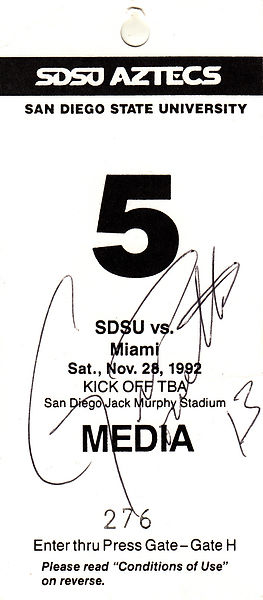
11/28/1992 at San Diego State
(Gino Torretta signed Media Pass)
(attendance 52,108)

1/1/1993 vs. Alabama
(Sugar Bowl)
(L 13-34)
(attendance 76,789)
1993 Charlie Ward - Florida State
A native of nearby Thomasville, Ga., Charlie Ward, as one of the most decorated players in the history of college football, Ward won literally every award he was eligible for as a senior quarterback on Florida State’s 1993 National Championship team. In addition, Ward was the sparkplug on three Seminole NCAA Tournament basketball teams.won the Heisman in 1993 after completing 69.5 percent of his passes for 3,032 yards with 27 touchdowns and only four interceptions. Ward's margin of victory was a massive 1,622 points, second at the time only to O.J. Simpson’s 1,750 point win in 1968. He also won the Davey O’Brien and Johnny Unitas Golden Arm Awards and was named Walter Camp Player of the Year and Toyota Leader of the Year. He is only the second college football player ever to win the Sullivan Award given annually to the nation’s top amateur athlete. Ward won Florida State’s first Heisman Trophy after a stellar season that saw him lead the Seminoles to an 11-1 record and a No. 1 AP ranking.
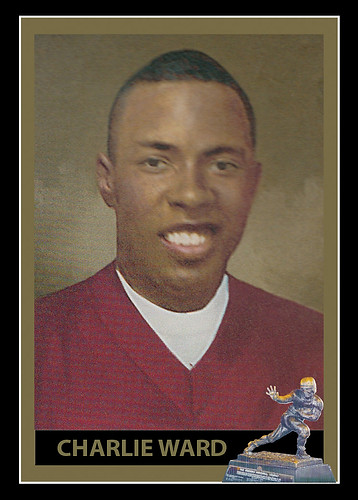
Charlie Ward Jr. (October 12, 1970)
On December 11,1993, Charlie ward was awarded the Heisman Trophy. After winning the Heisman, Ward guided the Seminoles to an 18-16 victory over Nebraska in the Orange Bowl, giving FSU and head coach Bobby Bowden its first-ever national title.On the basketball court, Ward pushed the Seminoles to the brink of the 1993 Final Four, falling one game shy. He also started on FSU’s Sweet 16 team in 1992 and hit the game-winning shot in its Metro Conference Tournament Championship game win over Louisville in 1991. Ward long held Seminole basketball records for steals in a game (9) and career (236) and ranks sixth all-time in assists (396). Ward passed over an NFL career and was drafted in 1994 by the New York Knickerbockers of the NBA, who selected him as the 26th overall pick. His 12-year NBA career also included stops with the Spurs and Rockets. He remains as the only Heisman winner to play in the NBA.
Charlie Ward was elected into the College Football Hall of Fame in 2006.

8/28/1993 vs. Kansas (Kickoff Classic)
(W 42-0)
(attendance 51,734)

9/4/1993 at Duke
(W 45-7)
(attendance 26,800)

9/11/1993 vs. Clemson
(W 57-0)
(attendance 74,991)

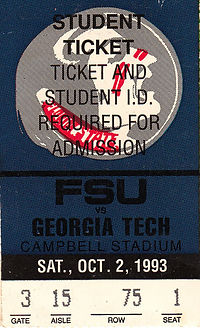
10/2/1993 vs. Georgia Tech
(W 51-0)
(attendance 74,611)
9/18/1993 at North Carolina
(full ticket)
(W 33-7)
(attendance 54,100)

10/9/1993 vs. Miami
(W 28-10)
(attendance 77,813)

10/16/1993 vs. Virginia
(W 40-14)
(attendance 76,607)

10/30/1993 vs. Wake Forest
(W 54-0)
(attendance 66,666)


11/13/1993 at Notre Dame
(L 24-31)
(attendance 59,075)
11/6/1993 at Maryland
(W 49-20)
(attendance 36,255)
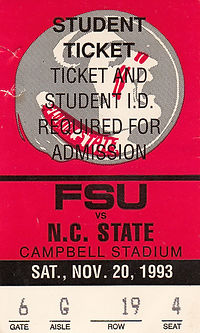
11/20/1993 vs. North Carolina State
(W 62-3)
(attendance 73,123)

11/27/1993 at Florida
(Stadium Operations pass)
(attendance 85,507)

11/27/1993 at Florida
(W 33-21)
(attendance 85,507)


12/14/1993 Heisman Trophy Presentation ticket

12/14/1993 Post-Heisman Dinner Reception ticket
12/11/1993 Heisman Trophy Announcement
Credential
1994 Rashaan Salaam - Colorado

Salaam was born in San Diego, Calif., the son of former Cincinnati Bengals running back Teddy Washington. He attended La Jolla Country Day and played eight-man football. He ran for over 100 yards in every game except one, and was recognized as a high school All-American as a 1991 senior. Naturally, he was coveted by colleges from all around the country.
The 6-1, 225-pound Salaam chose to attend Colorado, which was two years removed from its first national title. He played sparingly as a true freshman, rushing for 158 yards and one touchdown, but he came into his own as a sophomore, gaining 844 yards and scoring eight touchdowns while sharing carries with Lamont Warren. Salaam truly broke out as a junior, ripping off 10 100-yard games — including four over 200 yards — as he joined Marcus Allen, Mike Rozier and Barry Sanders in the 2,000 yard club.
He totaled 2,055 yards and 24 touchdowns on the season while averaging a remarkable 7.61 yards per carry. Salaam helped guide the Buffaloes to a 10-1 regular season record and a No. 4 ranking. Rashaan Salaam was awarded the Heisman Trophy on December 11, 1994. Salaam won Colorado’s first Heisman after becoming the third Division I player top the 2,000-yard rushing barrier.
Heisman in hand, Salaam scored three touchdowns against Notre Dame in the Fiesta Bowl as Colorado climbed to 11-1 and No. 3 in the final rankings.
Salaam chose to forgo his final season of eligibility and was selected by the Chicago Bears in the first round of the 1995 NFL draft with the 21st overall pick. He played three years for the Bears, including a rookie season that saw him rush for 1,074 yards.
Rashaan Salaam was elected into the College Football Hall of Fame in 2022.
Rashaan Iman Salaam (October 8, 1974 - December 5, 2016)


9/17/1994 vs. Wisconsin
(W 55-17)
(attendance 53,457)

9/3/1994 vs. North East Louisiana
(student ticket)
(W 48-13)
(attendance 48,814)
9/17/1994 vs. Wisconsin
(student ticket)
(W 55-17)
(attendance 53,457)


10/1/1994 at Missouri
(W 38-23)
(attendance 38,901)
10/1/1994 at Texas
(W 34-31)
(attendance 77,809)

9/24/1994 at Michigan
(W 27-26)
(attendance 106,427)

10/15/1994 vs. Oklahoma
(W 45-7)
(attendance 53,199)

10/22/1994 vs. Kansas State
(35-21)
(attendance 52,955)

10/29/1994 at Nebraska
(L 7-24)
(attendance 76,131)


11/5/1994 vs. Oklahoma State
(W 17-2)
(attendance 51,059)

10/29/1994 at Nebraska
(stadium employee pass)
(attendance 76,131)

11/19/1994 vs. Iowa State
(W 41-20)
(attendance 46,113)
11/12/1994 at Kansas
(full ticket)
(W 51-26)
(attendance 35,000)

12/10/1994 Heisman Trophy
Announcement Credential

12/13/1994 Heisman Trophy Presentation ticket
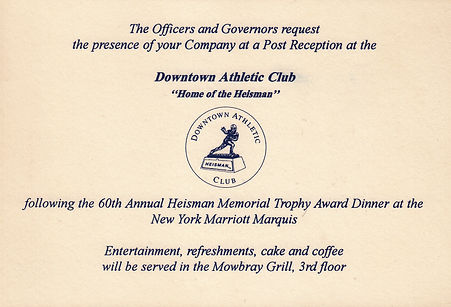
12/13/1994 Post-Heisman Dinner Reception ticket
1995 Eddie George - Ohio State
George was born in Philadelphia, Penn., and attended Abington High School until the tenth grade before transferring to Fork Union Military Academy in Fork Union, Virg. George played a fifth year at Fork Union, rushing for 1,372 yards in 1991 while garnering the attention of several major colleges.
The 6-3, 230-pound George chose to attend Ohio State and he got on the field right away as a 1992 freshman, rushing for 176 yards and five touchdowns. He had just 223 yards and three scores as a sophomore, but broke out with 1,442 yards and 12 touchdowns as a junior in 1994. As a senior, George averaged 152.2 yards per game and scored 23 touchdowns, rushing for over 100 yards in 11 straight games after gaining 99 in the Kickoff Classic against Boston College. He pounded his way to 1,826 yards and 23 touchdowns as the Buckeyes finished 11-1 and ranked fourth in the country.

One of his best performances of the year was in a 45–26 win over Notre Dame, where he rushed for 207 yards, his third 200-yard game of the season. On December 9,1995, Eddie George was awarded the Heisman Trophy. He won the Heisman against a strong field that included Tommie Frazier of Nebraska and future Heisman winner Danny Wuerffel of Florida. George left Ohio State second in school history in career rushing yards (3,768) and third in rushing touchdowns (44). Overall, he finished with 4,284 all-purpose yards, 45 touchdowns, and a 5.5 yards per carry average.
George went on to a professional carrer when he was selected with the 14th overall pick by the Houston Oilers in the first round of the 1996 NFL Draft. He was named to the Pro-Bowl in 1997, 1998 and 1999.
Eddie George was inducted into the College Football Hall of Fame in 2011.
Edward Nathan George Jr. (September 24, 1973)

8/27/1995 vs. Boston College
(Kickoff Classic game)
(W 38-6)
(attendance 62,711)


9/23/1995 at Pittsburgh
(W 54-14)
(attendance 54,917)
9/16/1995 vs. Washington
(W 30-20)
(attendance 84,104)

9/30/1995 vs. Notre Dame
(W 45-26)
(attendance 95,537)

10/7/1995 at Penn State
(W 28-25)
(attendance 96,665)

10/14/1995 at Wisconsin
(ticket stub still wanted)
(W 27-16)
(attendance 79,507)

10/21/1995 vs. Purdue
(W 28-0)
(attendance 93,111)

10/28/1995 vs. Iowa
(W 56-35)
(attendance 93,314)

11/4/1995 at Minnesota
(W 49-21)
(attendance 46,418)

11/11/1995 vs. Illinois
(W 41-3)
(attendance 92,639)
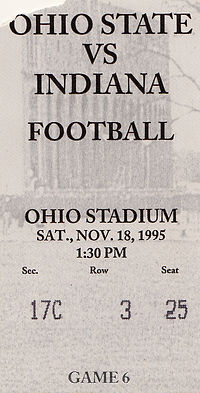
11/18/1995 vs. Indiana
(W 42-3)
(attendance 92,352)

11/25/1995 at Michigan
(L 23-31)
(attendance 106,288)

1995 Football Season Media Pass

12/8/1995 Heisman Trophy
Announcement Credential

12/11/1995 Heisman Trophy Presentation (guest ticket)
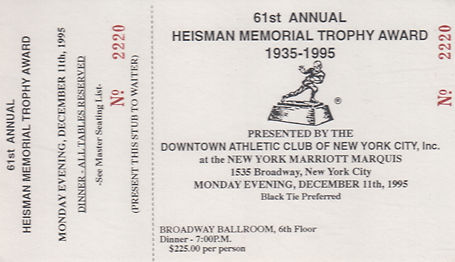
12/11/1995 Heisman Trophy Presentation ticket
1996 Danny Wuerffel - Florida
Wuerffel was born in Pensacola, Fla., the son of an Airforce Chaplin. He lived all over the country during his childhood, as well as three years in Spain, before he attended Fort Walton Beach (Fla) High. Wuerffel was his class valedictorian and led his football team to the state championship. He was widely considered the top player in the state of Florida as a 1991 senior. The 6-1, 210-pound Wuerffel signed with Florida the following spring and, after redshirting his first season in Gainesville, made a big impact as a freshman in 1993. Playing as part of a platoon with Terry Dean, Wuerffel threw for 2,230 yards and 22 touchdowns. In 1994, he started again in a platoon role but eventually took over the starting job, throwing for 1,754 yards and 18 scores. He had a breakout All-American season in 1995, throwing for 3,266 yards and 35 touchdowns while leading Florida to the national championship game against Nebraska. He would finish third in the Heisman voting.

Daniel Carl Wuerrffel (May 27, 1974)
Wuerffel bounced back in 1996 with another stellar season, throwing for 3,625 yards and 36 touchdowns as he guided the Gators to an 11-1 record and another shot at the national title.
Danny Wuerffel was awarded the Heisman Trophy on December 9, 1996. Wuerffel became the second player from the University of Florida to win the Heisman, joining his coach, Steve Spurrier. It marked the first time a Heisman winner came from a school coached by another former Heisman winner. After winning the Heisman, he threw for 306 yards and three TDs to lead Florida to a 52-20 victory over rival Florida State as the Gators claimed their first national title. Wuerffel was selected in the fourth round of the 1997 NFL draft (99th overall) by the New Orleans Saints. He spent six years in the NFL with the Saints, Packers, Bears and Redskins before retiring.
Danny Wuerffel was elected into the Collge Football Hall of Fame in 2013.
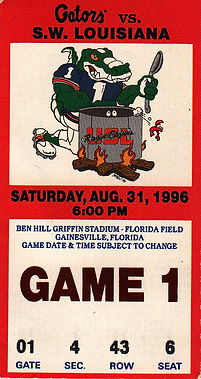
8/31/1996 vs. South West Louisiana
(W 55-21)
(attendance 85,050)

9/7/1996 vs. Georgia Southern
(W 62-14)
(attendance 84,963)

9/21/1996 at Tennessee
((W 35-29)
(attendance 107,608)

9/26/1996 vs. Kentucky
(W 65-0)
(attendance 85,422)
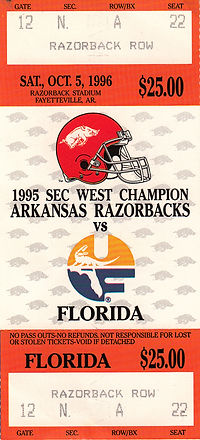

10/12/1996 vs. L.S.U.
(W 56-13)
(attendance 85,567)
10/5/1996 at Arkansas
(W 42-7)
(attendance 52,318)

10/19/1996 vs. Auburn
(W 51-10)
(attendance 85,697)

11/2/1996 vs. Georgia
(Jacksonville, FL)
(W 47-7)
(attendance 84,103)

11/9/1996 at Vanderbilt
(W 28-21)
(attendance 40,249)

11/16/1996 vs. South Carolina
(W 52-25)
(attendance 85,701)

11/30/1996 vs. Florida State
(L 21-24)
(attendance 80,932)

12/7/1996 vs. Alabama
(SEC Championship - Atlanta, GA)
(W 45-30)
(attendance 74,132)

12/14/1996 Heisman Trophy
Announcement Credential

12/16/1996 Heisman Trophy Presentation ticket

12/16/1996 Post-Heisman Trophy Presentation V.I.P. Reception
1997 Charles Woodson - Michigan
Woodson hails from Fremont, Ohio, and starred at Ross High, where he was named Ohio’s Player of the Year as a 1995 senior after rushing for a school-record 2,028 yards on 218 carries. Over his three years on the varsity team, he rushed for a total of 3,861 yards and 466 points. Coveted by schools from all around the country, Woodson signed with his dream school, Michigan, in the spring of 1996.
It didn’t take long for Woodson to make an impact for the Wolverines as he won a starting cornerback job two weeks into his first training camp. He ended up leading the team in 1995 with five interceptions on his way to being named the Big Ten Freshman of the Year and first-team all conference.
Before the start of his sophomore season, Woodson was approached by Michigan coach Lloyd Carr who asked if the player would consider playing on offense as well as defense. Woodson agreed to work out at wide receiver. Throughout his sophomore season, he ran about 10 plays each game on offense

Charles Cameron Woodson (October 7, 1976)
while holding on to his defense duties as cornerback. In 1996, Woodson set a Wolverine record for pass breakups with 15, while on offense he caught 13 passes for 164 yards and rushed for 152 yards on six carries. For his efforts, he was named an AP First Team All-American and a finalist for the Jim Thorpe Award. Woodson continued his fine play as a junior, intercepting seven passes and collecting 43 tackles while catching 11 passes for 231 yards and a touchdown. He was also effective as a punt returner. More importantly, Michigan finished the regular season undefeated and with a shot at its first national title since 1949. Charles Woodson was awarded the Heisman Trophy on December 13, 1997 over Peyton Manning. Woodson was drafted 4th overall by the Oakland Raiders in 1998 and was named the 1998 NFL Defensive Rookie of the Year. He went on to a NFL Hall of Fame career that also included a stint with Green Bay.
Charles Woodson was elected into the College Football Hall of Fame in 2018.
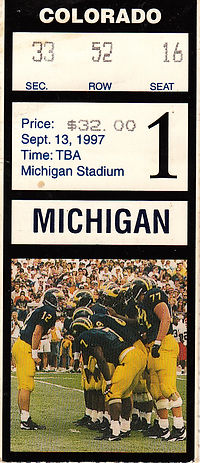
9/13/1997 vs. Colorado
(W 27-3)
(attendance 106,474)


9/27/1997 vs. Notre Dame
(W 21-14)
(attendance 106,508)
9/20/1997 vs. Baylor
(W 38-3)
(attendance 106,041)

10/4/1997 at Indiana
(W 37-0)
(attendance 42,240)

10/11/1997 vs. Northwestern
(W 23-6)
(attendance 106,048)

10/18/1997 vs. Iowa
(W 28-24)
(attendance 106,505)

10/25/1997 at Michigan State
(W 23-7)
(attendance 79,687)

11/1/1997 vs. Minnesota
(W 24-3)
(attendance 106,577)

11/8/1997 at Penn State
(W 34-8)
(attendance 97,498)

11/15/1997 at Wisconsin
(W 26-16)
(attendance 79,806)
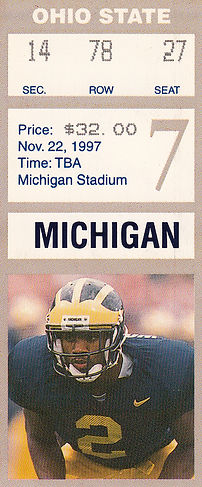
11/22/1997 vs. Ohio State
(W 20-14)
(attendance 106,982)
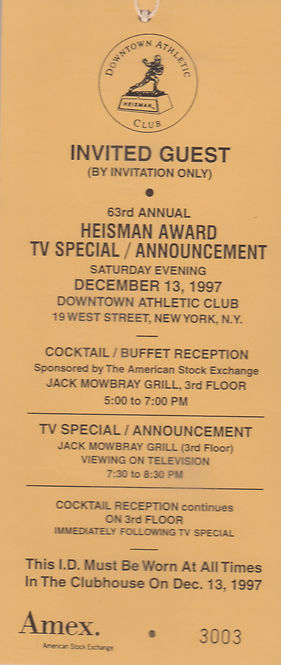

12/15/1997 Heisman Trphy Presentation ticket
12/13/1997 Heisman Trophy
Announcement Credential
1998 Ricky Williams - Texas
The 6-foot, 225-pound Williams was born in San Diego, Calif., where he prepped at Patrick Henry High. He was considered one of the top running backs in the country as a 1994 senior, when he rushed for 2,099 yards and 25 touchdowns. Williams left the West Coast and signed with Texas, citing the state’s love of football.
He began his career in Austin as a fullback in a freshman year that saw him break Campbell’s freshman rushing record with 990 yards and eight touchdowns on just 166 carries. As a sophomore, he rushed for 100 yards seven times and registered 1,272 yards and 12 TDs.
Williams broke out as a junior, leading the nation with 1,893 rushing yards and 25 touchdowns while finishing fifth in the 1997 Heisman vote. He entered 1998 as one of the front runners for the award and, also, within reach of Dorsett’s record. Williams solidified his place in college football history with a dash

to that record in 1998.
Ricky Williams was awarded the Heisman Trophy on December 12, 1998. Williams led Texas to a 9-3 record, set 21 NCAA records and received what was then the greatest percentage of first-place votes cast in Heisman history (43% of the 920 voters). Williams produced one of the finest seasons in college football history in 1998, rushing for 2,124 yards and 27 TDs. He also became the first-ever two-time winner of the Doak Walker Award and claimed the Maxwell and Walter Camp Foundation Player of the Year awards. In the 1999 NFL draft, Mike Ditka and the New Orleans Saints stunned the sports world by trading their entire draft in 1999 and first and third-round selections in 2000 (to the Washington Redskins) for the right to select Williams with the fifth pick.
Ricky Williams was elected into the College Football Hall of Fame in 2015.
Errick Lynne Williams Jr. (May 21, 1977)


9/12/1998 at U.C.L.A.
(L 31-49)
(attendance 73,070)
9/5/1998 vs. New Mexico State
(full ticket)
(W 66-36)
(attendance 75,914)

9/19/1998 at Kansas State
(full ticket)
(L 7-48)
(attendance 43,714)

9/26/1998 vs. Rice
(full ticket)
(W 59-21)
(attendance 71,486)

10/3/1998 vs. Iowa State
(full ticket)
(W 54-33)
(attendance 70,681)

10/10/1998 vs. Texas (Red River Shootout - Dallas, TX - full ticket)
(W 34-3)
(attendance 75,587)

10/24/1998 vs. Baylor
(full ticket)
(W 30-20)
(attendance 81,437)

10/31/1998 at Nebraska
(full ticket)
(W 20-16)
(attendance 76,434)

11/7/1998 vs. Oklahoma State
(full ticket)
(W 37-24)
(attendance 81,437)

11/14/1998 at Texas Tech
(L 35-42)
(attendance 50,647)


11/27/1998 vs. Texas A&M
(full ticket)
(W 26-24)
(attendance 83,687)

12/14/1998 Heisman Trophy Presentation ticket
12/12/1998 Heisman Trophy
Announcement Credential
1999 Ron Dayne - Wisconsin
Dayne was born in Blacksburg, Va., but grew up mostly in New Jersey. His stardom began while attending Overbrook High School in Pine Hill, where he was heavily recruited for his football and track and field prowess. He won state titles in both the shot put and discus — his best of 216-11 in the discus throw is still one of the best prep marks of all time. On the gridiron, he rushed for 1,566 yards and scored 27 touchdowns as a junior and followed that up with 1,785 yards and 24 TDs as a senior.
Dayne averaged over 10 yards per carry during his high-school career, but as a 270-pound athlete, the expectation was that he would not play tailback in college. Most schools recruited him as a fullback, but Wisconsin saw him as a primary ball carrier, so he signed to play for the Badgers in the spring of 1996. His impact was immediate and huge. The “Dayne Train” carried the ball 1,220 times in his college career, becoming the

work horse in Wisconsin’s fabled ground game. He gained 1,863 yards as a freshman, 1,421 as a sophomore, 1,325 as a junior, and 1,834 as a senior, becoming one of only five players to rush for over a thousand yards in four consecutive years. He ended his college career with 6,397 rushing yards, a total that still stands as the most ever in FBS history, eclipsing Ricky Williams previous record set in 1998. On December 11, 1999, Ron Dayne was awarded the Heisman Trophy. Dayne led Wisconsin to back-to-back Rose Bowl victories in his final two seasons. In those games, he came up huge, rushing for a combined 446 yards in wins over UCLA and Stanford. He’s the only Big Ten player in history to win back-to-back Rose Bowl MVP awards. Dayne was drafted with the 11th overall pick by the New York Giants in the 2000 NFL draft.
Ron Dayne was elected into the College Football Hall of Fame in 2013.
Ronald Dayne (March 14, 1978)

9/4/1999 vs. Murray State
(W 49-10)
(attendance 77,527)

9/11/1999 vs. Ball State
(W 50-10)
(attendance 75,807)

9/18/1999 at Cincinnati (full ticket)
(L 12-17)
(attendance 27,721)



10/9/1999 at Minnesota
(W 20-17)
(attendance 63,108)
10/2/1999 at Ohio State
(W 42-17)
(attendance 93,524)
9/25/1999 vs. Michigan
(L 16-21)
(attendance 79,037)
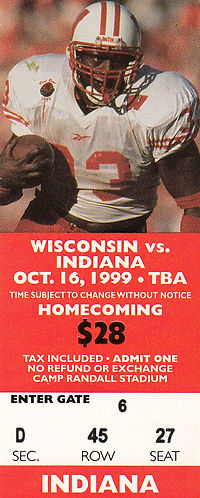
10/16/1999 vs. Indiana
(W 59-0)
(attendance 78,243)

10/23/1999 vs. Michigan State
(W 40-10)
(attendance 78,469)

10/30/1999 at Northwestern (full ticket)
(W 35-19)
(attendance 42,292)

11/6/1999 at Purdue
(W 28-21)
(attendance 67,308)
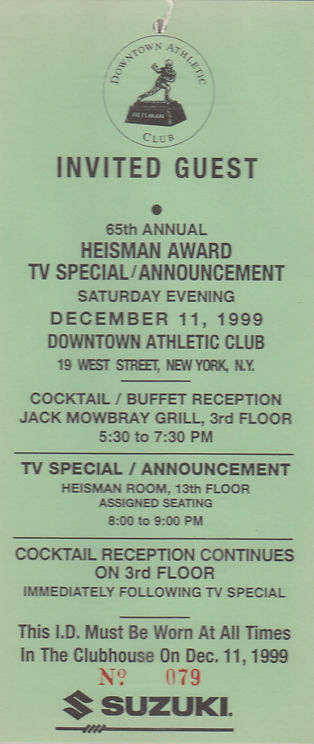
12/11/1999 Heisman Trophy
Announcement Credential

11/13/1999 vs. Iowa
(W 41-3)
(attendance 79,404)

12/13/1999 Heisman Trophy
Presentation ticket
